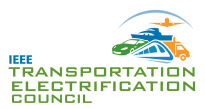CFP: 2021 IEEE 12th International Symposium on Power Electronics for Distributed Generation Systems (PEDG 2021) - June 27-30, 2021
The 2021 IEEE 12th International Symposium on Power Electronics for Distributed Generation Systems (PEDG 2021) will be held between June 27-30, 2021. This international symposium, sponsored by IEEE Power Electronics Society (PELS) and organized by the PELS Technical Committee on Sustainable Energy Systems, will provide a venue for experts to present the results of their cutting-edge research in power electronics and distributed generation (DG) systems. PEDG 2021 will feature all-virtual plenary speeches, tutorials, and regular technical and poster sessions on theory, analysis, design and development, testing, deployment, and impact of power electronics for DG and systems, energy storage systems, and sustainable sources.
All Virtual Conference
PEDG 2021 will be hosted entirely on an engaging and easily accessible online platform. Attendees will gain a unique opportunity to connect with the global power electronics community and gain access to the various technical sessions that PEDG 2021 has to offer.
Call for Papers
Click here to download the Current Call for Papers
Prospective participants are invited to submit an extended abstract of their original work. The document should be in English and should not exceed five single-column double-spaced pages (excluding references). The submitted abstracts will be subjected to a peer-review process. Detailed instructions on the preparation of the abstracts and the submission process will be available on the symposium website.
Technical papers are solicited on any subject pertaining to the scope of the symposium that includes, but is not limited to, the following major topics:
Track 1: Power Electronics for Sustainable Sources
- New power-converter controls for wind, solar PV, CHP, wave and tidal, fuel cell, other DERs
- High-efficiency power conversion for sustainable sources: efficiency improvements using new topologies, WBG/UWBG power semiconductor devices, and magnetic materials
- Multi-port or multi-level power converters and applications
- Grid integration using solid-state transformers, controllable distribution flexible alternating current transmission systems (D-FACTS), and medium voltage DC distribution
- Islanding detection, protection, and standards of DG systems
Track 2: Energy Storage Systems
- Power electronics for battery, supercapacitor, and hybrid energy storage systems
- Power electronics for wireless and wired charging/super-charging and operation of electric, hybrid electric, and plug-in hybrid electric vehicles
- Energy management, optimal sizing of energy storage, and power converter systems for various cases including peak shaving, intermittency mitigation etc.
Track 3: Distributed Generation Interacting with Power Transmission and Distribution Systems
- AC/DC microgrids and nanogrids – grid interconnected and islanded operation, networked microgrids
- Distributed generation power electronics and electric power quality – voltage, frequency, harmonics impacts, and mitigation
- Power electronics as power stations: demand response, high penetration of distributed generation power electronics in the grid, and renewables generation forecasting applied to power electronics
Track 4: Other Advanced Topics
- Power semiconductor modules development for distributed generation power electronics
- Power electronics and cybersecurity issues (including digital twin applications)
- Internet of thing (IoT) and internet of everything (IoE) devices and technologies for cyber-physical sustainable-energy systems
- Hardware-in-the-loop (HIL) systems and real-time simulation for distributed generation
- New and evolving standards (e.g., for electric-vehicle charging, cybersecurity, solid-state transformers, microgrid/virtual power plants), energy policy, and public policy issues relating to power electronics-based distributed and sustainable generation systems
Important Dates
Initial Submission Due: December 15, 2020
Notification of Acceptance: March 15, 2021
Final Manuscript Due: April 30, 2021


